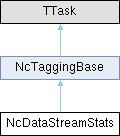Provide event classification tag statistics.
Copyright(c) 2028 NCFS/IIHE, All Rights Reserved. *
*
Authors: The Netherlands Center for Fundamental Studies (NCFS). *
The Inter-university Institute for High Energies (IIHE). *
Website : http:
Contact : Nick van Eijndhoven (nickve.nl@gmail.com) *
*
Contributors are mentioned in the code where appropriate. *
*
No part of this software may be used, copied, modified or distributed *
by any means nor transmitted or translated into machine language for *
commercial purposes without written permission by the IIHE representative. *
Permission to use the software strictly for non-commercial purposes *
is hereby granted without fee, provided that the above copyright notice *
appears in all copies and that both the copyright notice and this *
permission notice appear in the supporting documentation. *
This software is provided "as is" without express or implied warranty. *
The authors make no claims that this software is free of error, or is *
consistent with any particular standard of merchantability, or that it *
will meet your requirements for any particular application, other than *
indicated in the corresponding documentation. *
This software should not be relied on for solving a problem whose *
incorrect solution could result in injury to a person or loss of property. *
If you do use this software in such a manner, it is at your own risk. *
The authors disclaim all liability for direct or consequential damage *
resulting from your use of this software. *

 Public Member Functions inherited from NcTaggingBase
Public Member Functions inherited from NcTaggingBase Protected Attributes inherited from NcTaggingBase
Protected Attributes inherited from NcTaggingBase Protected Member Functions inherited from NcTaggingBase
Protected Member Functions inherited from NcTaggingBase